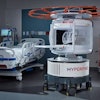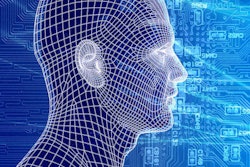
Both radiologists and medical students tend to be positive about the role artificial intelligence (AI) can play in the specialty, but more education about the technology is needed, according to a study published January 31 in Academic Radiology.
For the most part, both radiologists and medical students believe a lack of education and training about AI could limit the technology from achieving its full potential, wrote study authors Samantha Santomartino and Dr. Paul Yi, both of the University of Maryland in Baltimore.
"[Current] radiology attendings and trainees see the value in AI for radiology and are, overall, optimistic about its role in the field, as are medical students," Santomartino and Yi noted. "At the same time, radiologists and medical students report a gap in formal education or training on these topics, which may present a barrier to achieving the full potential of AI solutions in radiology."
AI's proponents hope it will automate a variety of tasks, thereby streamlining workflow in the radiology department. But its critics worry that the technology will replace radiologists -- which could affect whether medical students choose to specialize in medical imaging.
Previous studies have assessed attitudes toward the role of AI in radiology among medical students, radiology residents, and radiology attendings, but they've been based on small sample sizes, according to Santomartino and Yi. The two sought to expand the scope of investigation into attitudes toward AI in radiology through a literature review.
Their research included 19 studies listed on PubMed and published in 14 different journals between 2018 and 2021. The studies uncovered a variety of themes, from the knowledge and familiarity with AI among survey respondents and AI's potential impact on the practice of radiology to questions of responsibility for developing and managing AI in radiology and confidence in AI results.
Santomartino and Yi found the following:
- Both radiologists and medical students reported a gap in formal AI education.
- Most respondents agreed that AI would not jeopardize radiology jobs.
- Most respondents agreed that AI has the potential to exert positive impact on radiology practice.
- Most survey respondents stated that radiologists should take leadership in implementing AI.
- Santomartino and Yi found that study participants were optimistic about the role of AI in radiology, although radiologists and trainees were more enthusiastic than medical students.
Survey participants were more cautious when it came to confidence in AI results, however.
"Overall, there was a hesitancy toward trusting fully autonomous results, with many respondents expecting that radiologist presence will remain necessary for safety and quality checks," Santomartino and Yi wrote.
What do the study findings suggest? More education about AI is needed, both for medical students and for radiologists.
"We recommend that healthcare educators integrate AI teaching into medical school and radiology residency curricula, to make the topic more transparent and accessible, to better inform medical students about the potential benefits of AI to radiology, and to facilitate the acceptance and implementation of this exciting and potentially transformative technology into clinical practice," Santomartino and Yi concluded.




















